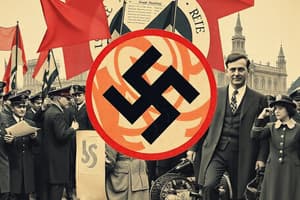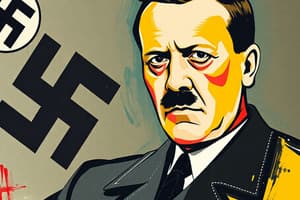Podcast
Questions and Answers
What was the name of the government that took charge in Germany after Kaiser Wilhelm II went into exile?
What was the name of the government that took charge in Germany after Kaiser Wilhelm II went into exile?
- The National Socialist Government
- The Provisional Government (correct)
- The Weimar Government
- The Socialist Assembly
Which clause in the Treaty of Versailles held Germany responsible for the war?
Which clause in the Treaty of Versailles held Germany responsible for the war?
- War Guilt Clause (correct)
- Defensive Clause
- Diktat Clause
- Reparation Clause
What event was characterized by a right-wing attempt to overthrow the Weimar Republic in 1920?
What event was characterized by a right-wing attempt to overthrow the Weimar Republic in 1920?
- The Kapp Putsch (correct)
- The Spartacist Uprising
- The March on Berlin
- The Beer Hall Putsch
Which Article of the Weimar Constitution allowed the President to take emergency measures without consent from the Reichstag?
Which Article of the Weimar Constitution allowed the President to take emergency measures without consent from the Reichstag?
Who was the first Chancellor of the Weimar Republic?
Who was the first Chancellor of the Weimar Republic?
What term describes the perceived betrayal of Germany by its leaders after WWI?
What term describes the perceived betrayal of Germany by its leaders after WWI?
What major change did Germany experience politically after the end of WWI?
What major change did Germany experience politically after the end of WWI?
Which group was involved in suppressing the left-wing Spartacist Uprising in 1919?
Which group was involved in suppressing the left-wing Spartacist Uprising in 1919?
What was the main consequence of the hyperinflation experienced in Germany after World War I?
What was the main consequence of the hyperinflation experienced in Germany after World War I?
What action did the Weimar government take in response to the French and Belgian occupation of the Ruhr?
What action did the Weimar government take in response to the French and Belgian occupation of the Ruhr?
What was one of Gustav Stresemann's key policies during his tenure?
What was one of Gustav Stresemann's key policies during his tenure?
Which event marked the decline of the Weimar economy that led to Heinrich Bruning's chancellorship?
Which event marked the decline of the Weimar economy that led to Heinrich Bruning's chancellorship?
What ideology did the German Workers' Party (DAP) mainly focus on?
What ideology did the German Workers' Party (DAP) mainly focus on?
What did the 25 point programme introduced by Hitler emphasize?
What did the 25 point programme introduced by Hitler emphasize?
What was one outcome of Bruning's policies as Chancellor?
What was one outcome of Bruning's policies as Chancellor?
What role did Adolf Hitler play in the German Workers' Party before it became the Nazi Party?
What role did Adolf Hitler play in the German Workers' Party before it became the Nazi Party?
Flashcards
Weimar Republic
Weimar Republic
Germany's democratic republic established after World War I.
Article 48
Article 48
Weimar Republic's emergency decree power, enabling the president to bypass parliament.
Treaty of Versailles
Treaty of Versailles
Peace treaty after WWI, imposing harsh terms on Germany.
Kapp Putsch
Kapp Putsch
Signup and view all the flashcards
Friedrich Ebert
Friedrich Ebert
Signup and view all the flashcards
Reparations
Reparations
Signup and view all the flashcards
Stab-in-the-Back myth
Stab-in-the-Back myth
Signup and view all the flashcards
Social Democratic Party
Social Democratic Party
Signup and view all the flashcards
German Hyperinflation
German Hyperinflation
Signup and view all the flashcards
Ruhr Occupation
Ruhr Occupation
Signup and view all the flashcards
Weimar Government's Response to Inflation
Weimar Government's Response to Inflation
Signup and view all the flashcards
Dawes Plan
Dawes Plan
Signup and view all the flashcards
Locarno Pact
Locarno Pact
Signup and view all the flashcards
Wall Street Crash (1929)
Wall Street Crash (1929)
Signup and view all the flashcards
Heinrich Bruning
Heinrich Bruning
Signup and view all the flashcards
Nazi Party's Rise
Nazi Party's Rise
Signup and view all the flashcards
Study Notes
Weimar Republic: Collapse and Rise of the Nazi Party
- Weimar Republic, Germany's democratic government established in 1919, faced numerous challenges.
- Its constitution included a president, chancellor, and two houses of parliament (Reichstag and Reichstrat). Crucially, Article 48 allowed the president to enact emergency measures without Reichstag approval, a factor in instability.
Challenges to the Weimar Republic
- Treaty of Versailles: Germany lost territories, was forced to reduce its army, and faced crippling reparations. This perceived humiliation fueled resentment and nationalist sentiment.
- Economic hardship: High inflation, war debts, and reparations created social and economic instability. The hyperinflation crisis (1923) severely damaged the middle class and eroded faith in the government.
- Political unrest: Several attempted coups and uprisings (e.g., Kapp Putsch, Spartakist uprising) highlighted the fragility of the Weimar government and the strength of opposing political forces.
Role of the Nazi Party
- Nazi Party's origins: The Nazi Party emerged from the German Workers' Party (DAP) in 1919, gaining traction on platforms of German nationalism, anti-communism, and antisemitism.
- Hitler's rise: Hitler, a member of the DAP, took control of its propaganda and formulated a 25-point program denouncing the Treaty of Versailles. This program emphasized aggressive expansionist policies and radical nationalism.
- Economic hardship and extremist parties: Worldwide economic crisis, including the Wall Street Crash (1929) and subsequent decline in German economy, led to increased support for anti-democratic parties. Unemployment soared, creating a fertile ground for extremist ideologies.
Stresemann Era and Recovery Attempts
- Gustav Stresemann: As Chancellor in 1923, Stresemann aimed to improve the economy and international relations.
- Agreements: His policies included the Dawes Plan (1924), aimed at restructuring German reparations payments, and the Locarno Pact (1926) improving relations with the Allies. Other policies like the Young Plan further attempted to ease the reparations burden.
- Early success: These efforts initially brought about a period of relative economic stability and international cooperation.
Breakdown and Rise of the Nazi Party
- Bruning Chancellor and economic crisis: The subsequent Wall Street Crash of 1929 and subsequent Depression deeply impacted Germany's recovery, leading to the appointment of Heinrich Bruning as chancellor, who's policies of austerity (reducing wages and government spending) exacerbated the economic crisis and fostered widespread dissatisfaction.
Studying That Suits You
Use AI to generate personalized quizzes and flashcards to suit your learning preferences.
Description
Explore the tumultuous period of the Weimar Republic and the factors leading to the rise of the Nazi Party. Examine the challenges faced by the democratic government, including the effects of the Treaty of Versailles, economic hardship, and political unrest. This quiz delves into the historical context that shaped Germany in the early 20th century.




